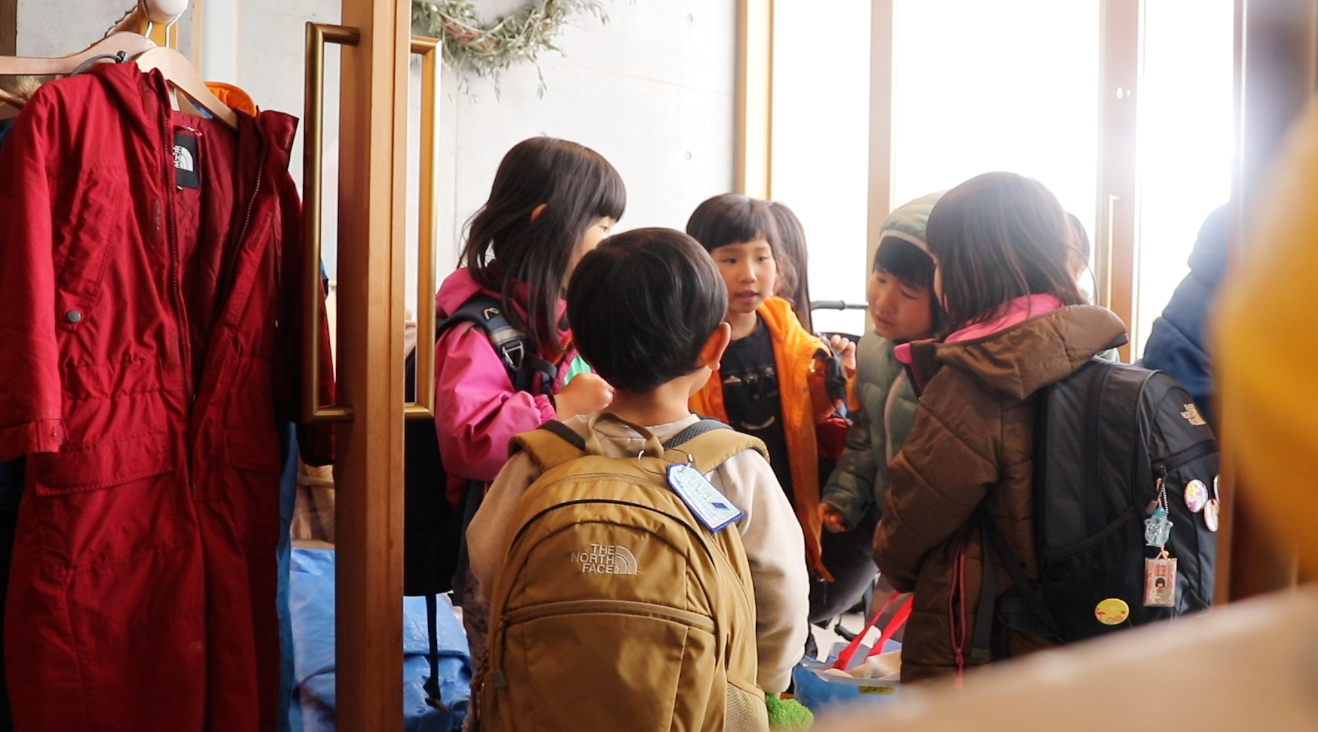
2021.03.01 Children’s Rebellion and Freedom
Text : Aya Endo
On February 9, a while after the beginning of spring, a rebellion by the children of the Akebi occurred. The origin of the matter was that an accident occurred in which another child accidentally broke the ice that was being made outside by an older child, S-kun, who seemed to be a little sluggish that day. S-kun returned to the room looking angry at the ice breaking. He was not calm, saying, “I hate this place! I’m quitting!“.
The children around me are inspired by S-kun’s appearance and gathered. They say in discontentment, “Adults have snacks in the room and we do not! It’s not fair.“ “I saw A-san eating rice crackers in the office! It’s unfair!“ “I don’t want to take a nap!“ “Kimchi fried rice isn’t served here!“ In addition, there was an incident in which children snuck into the office and stole peanuts. T-kun was very excited, saying, “I’m gonna smash Yamanoko into pieces!“
Next, the children gathered at the entrance with a nap sheet, a comforter, and a change of clothes, and a backpack that was inflated to the brim. There were eight members: S-kun, J-kun, A-chan, H-kun, K-chan, K-chan, R-kun, and E-kun. They looked just like running away from home. Everyone has a triumphant look. When they came to the front of the gate to get out of Yamanoko together, they met S-san who just came back from Kune Kune Yama.
S-san said to the children, “I’m in trouble if everyone is gone,“ and surprisingly, they came back to my room. However, it seems that the excitement does not cool down even after putting down the backpack. “If I come home today, I’ll never come back tomorrow!“ E-kun said. After that, it was time to take a nap after eating lunch, but K-chan, K-chan, and E-kun insisted that they go out with the older kids. It seems that they wanted to go to SORAI together. While the older kids who had not participated in the rebellion were involved, discussions began at the entrance with T-san.
“K-chan hasn’t paid the entrance fee for SORAI. What should we do with the money?“ “Another K-chan is a member.“ “I wonder if I can ask my mom to bring me some money.“ “But tomorrow is a holiday for SORAI.“ They are seriously thinking, “Well, what should we do …“. About 20 minutes later, older boys who wanted to go to SORAI quickly ran out of patience and said, “Only older people can go. Go back to your room(to the younger kids).“ On the other hand, the older girls keep thinking while staying close to each other. As a result of discussing for about 30 minutes, K-chan, K-chan, E-kun and older A-chan stayed in Yamanoko, and everyone seemed to be convinced and disappointed.
From S-kun’s “I am going to quit this place!“, there started a revolt. I was rooting for them inside my heart and I’m sure many adults were excited about this transgression. It is very rare and amazing to share a collective anger. The fact that they are able to voice their discontentment and negative feelings about community perhaps is because there is a security that that they are safe with their emotions and that they can make an impact. Also, the feeling that they can make the best solution for themselves if they had talked, says to me that they have built a sense of trust for themselves and their peers. It is truly remarkable the power grows inside of the children’s hearts. This makes me proud to have built Yamanoko.
Some of what children had discontent for are incredibly accurate and understandable and calls for a reexamination within the system. To be free in a collective is a theme that we have been thinking for quite some time now, and we have been bound between freedom and restrictions. It is merely impossible to be free from exterior factors such as society and environment. However, I don’t want to help reduce the potential of the child in order to adapt to society on the premise of being inconvenient in advance.
If we can have mental freedom under any inconvenient situation, we can be truly free. I hope that we can lay the foundation for such power to grow in these days of Yamanoko.
Lastly, I would like to introduce a sentence from the book “Freedom for Children“ (Iwanami Shinsho, 1973) by pediatrician Michio Matsuda, which I have read from time to time since I encountered this book when I was in my twenties.
“Educators have doubts about themselves. Education is a scaffolding for today’s culture that has already been established to teach children. In 20 or 30 years, children will create something different from today’s culture. It must change the bad parts of the current culture. Some of what we have taught as education will be denied. You also have to raise a child who can do that. Education has the contradiction of inviting those who deny it. Being aware of this contradiction means doubting yourself.
In order for children to deny the present culture and create a new culture in the future, they must inspire their creativity. Educators are constantly aware of how children can be creative in the current situation. To do this, we must cherish what each child has. Children show their individuality only when they have freedom.“













 PREV
PREV